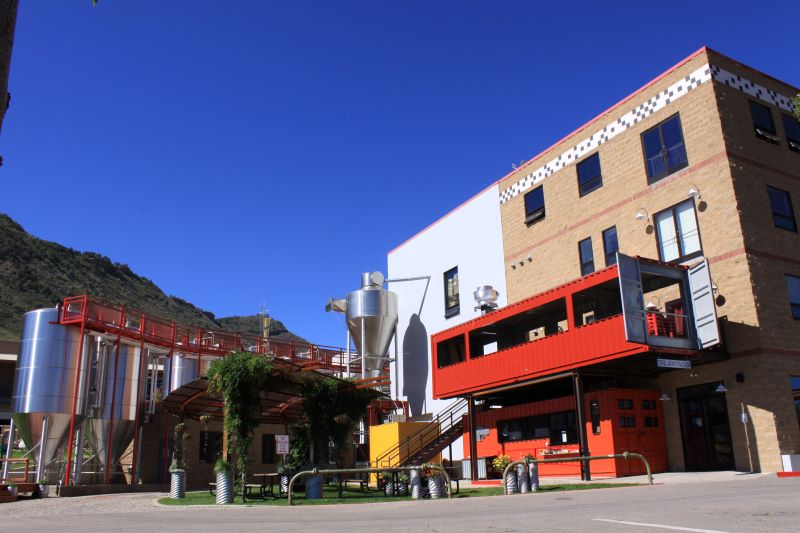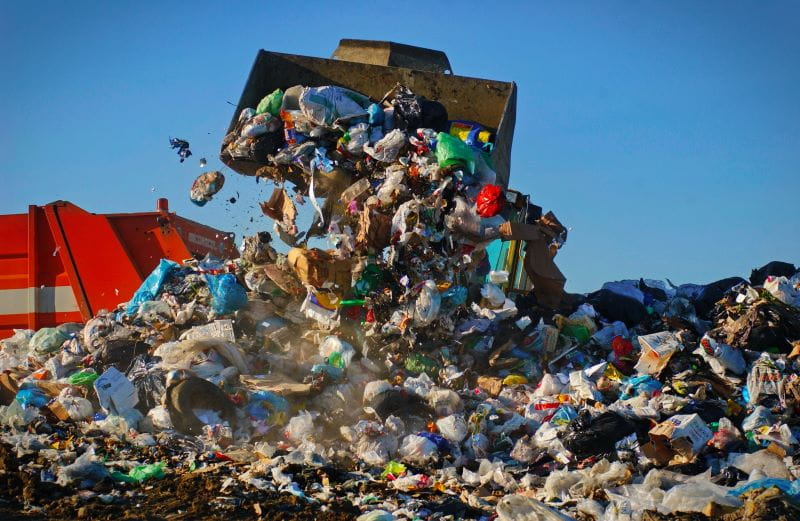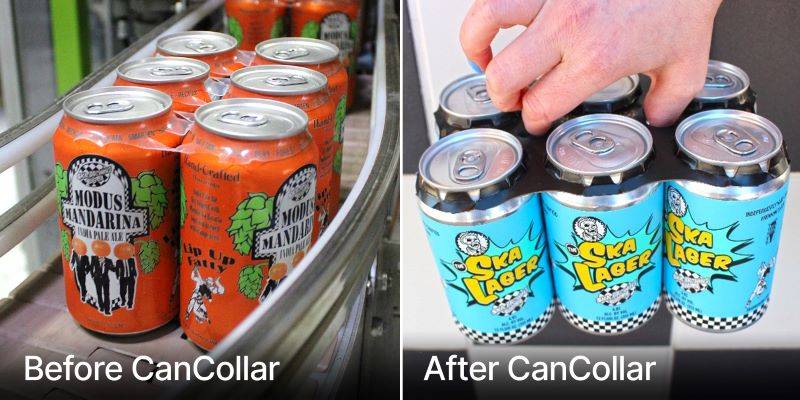How a major craft brewer replaced plastic packaging with a paper-based innovation

Visiting Ska Brewing’s flagship location in the hills outside downtown Durango, Colo. is as much for the experience as it is for its spirited music-and-comic-book-inspired brews.
Chill with your furry, four-legged friend in the large outdoor beer garden.
Chow down in the restaurant partly made from two up-cycled shipping containers.
Or venture to the upstairs meeting space for some “Happy Hour Yoga” — just $10 for a class and a pint-sized glass of Ska brew to savor when you’re done.
“It’s a pretty cool draw on a quiet Monday night, and it’s a great way to start your week, especially if it was a hard Monday,” said Ska Brewing COO Steve Breezley.
For this well-established Colorado brewer, appreciating the great outdoors and fostering a laid-back lifestyle are at the foundation of its brand and the attitude of its workers and customers. As a result, its leaders made efforts in past years to embrace a circular economy, one based on eliminating pollution and manufacturing products that can be reused or recycled. They made environmentally responsible choices to water the lawn with recycled water, reduce water consumption in the brewhouses, and to put craft beer in recyclable cans instead of glass simply because cans are more likely to end up on a rafting or backpacking trip.

While there’s a greater chance a canned 6-pack will get put in a mesh bag, hooked to a kayak and thrown over the side to stay cool in the river, the plastic rings used to pack these cans was, for them, like that unwanted guest at your childhood birthday party—you didn’t like them, but your mom made you invite them anyway. And the leaders at Ska were determined to disinvite plastic to this outdoor-loving, yoga-posing, craft-beer-drinking party.
“Our goal is to move away from plastic, for sure, and just try to minimize materials in general,” said Breezley.
But isn’t plastic packaging recyclable and therefore circular?
It can be recycled, but that doesn’t mean it is.

Right now, it’s estimated only 15% of the world’s plastic is recycled.1 Additionally, plastic rings are refused by most trash recyclers as they’re considered a “hard-to-recycle" plastic. One company even made its niche in promising to recycle difficult plastics, and according to a Bloomberg report, they may be failing at it.
When it comes to plastic in general, most trash collectors won’t recycle it because there are no plastic recyclers who’ll take it from them, which means they end up throwing it in their landfills.2 Why? Most of them used to send plastic recycling to China, and without that as an option now, recyclers have nowhere else to go. There are few domestic partners to choose from because there’s no market for it; recycling plastic is expensive and it’s just cheaper to make more.

There has to be a better option
The founders of Ska brewing knew their plastic was ending up in landfills, which didn’t sit well with these outdoorsmen. “We explored alternatives, looking for a solution that would deliver in terms of durability and appearance, while also reducing environmental impact,” said Breezley. At the time they found more disappointment than cost-effective solutions.
The team considered wrapping the entire six-pack in recyclable paperboard (traditionally done for 12-packs), but they determined that would increase their current cost of production and also the energy and resources needed to produce the packaging. Another option, using plastic can lids, would mean that wildlife wouldn’t have to contend with plastic rings, but it would increase their usage of single-use plastic. The Ska Brewing team knew there had to be a better way.
Enter WestRock, a global leader in innovative fiber-based packaging solutions. COVID slowed down Ska’s search, and once the pandemic-dust settled the team realized WestRock had just released a new alternative called CanCollar®. This option provided the team with everything they needed and wanted.
The fiber-based CanCollar solution uses approximately 95% less plastic3 while keeping the costs comparable. “CanCollar immediately reduces the amount of plastic Ska contributes to the environment by approximately four tons a year,” said Breezley. “The innovation, ethos and ethics behind this solution are what we’re all about.”
Other beverage makers already using CanCollar include Asahi Breweries, a Japanese-based brewer, and Mexico-based Grupo Modelo, makers of Modelo and Corona beer, along with more than 150 craft breweries across North America. Grupo Modelo’s transition at their plant in Quintana Roo is expected to reduce the company’s use of single-use plastic by 100 tons a year.4
“It’s exciting to see CanCollar helping businesses in the beverage industry meet their sustainable packaging goals,” said Sam Shoemaker, WestRock President of Consumer Packaging. “These businesses, including Ska Brewing, are great examples of how others can replace plastic and make an efficient and smooth transition to fiber-based solutions.”
Ready for sweeping legislation against plastic
Over 500 municipalities in 28 states have passed some kind of ban or fine on single-use plastics, mostly affecting consumers. The Canadian federal government is taking huge measures to ban the production and import of single-use plastics, including six-pack rings, by 2025. And Europe has also taken a hard stance with the EU banning the sale of many single-use plastics in 2021, such as plastic cutlery, plates, straws, and balloon sticks.
Additionally, following Maine and Oregon, Colorado passed legislation in May of 2022 requiring manufacturers using certain materials, like plastic, to fund a statewide recycling program. Because Ska is using WestRock’s CanCollar packaging, the company expects to pay lower dues to the program compared to other craft brewers still using plastic rings.
Capitalizing on sustainability and technology grants
To automate the application of CanCollar to its six-packs, Ska decided to purchase the WestRock Corsair™ solution for use in its brewery. Implementing the Corsair meant that switching to CanCollar would not require more manpower and would allow the team to continue packaging cans at its current rate. The machine would also make it possible for Ska to package new offerings, such as four-packs of their 16-ounce cans.
To support this major investment, Ska applied for a Colorado state grant aimed at providing funds for “implementing early-stage technology” (and it would be the first craft brewery in the country to implement this technology). With the added benefit of helping the environment, the state’s Office of Economic Development and International Trade (OEDIT) saw Ska Brewing as a worthy candidate and awarded them the grant.
Providing a good percentage of their overall investment, the OEDIT made it easier for Ska to purchase the Corsair and put their new CanCollar six-packs on shelves starting in April 2023.
“OEDIT's Advanced Industries Accelerator Program supports innovative companies that are disrupting their industries, and Ska Brewing is certainly revolutionizing the brewing industry with its packaging technology for environmentally friendly CanCollars,” said Rama Haris, Colorado’s Advanced Industries senior manager of global business development.
Encouraging sustainability among brewers and beverage manufacturers
With the right solution in place, Ska’s leaders are now able to focus their collective attention on other matters, such as new brews and introducing their new four-packs. They say they’re not the only ones loving their new packaging.
“We actually just ran out of our first 16-ounce four-packs,” said Breezley. “When there are 12 IPAs in front of you, it's hard to grab attention. (CanCollar) helps set us apart from some of our competitors in a positive way, because the feedback we've already had is like, ‘I love seeing this. It's great. You guys don't have plastic.’”
Since craft brewers embrace collaboration over competition, Ska Brewing Founder Dave Thibodeau hopes what they’re doing will not only encourage other brewers but also allow them to consult and guide others through the process of making the change to fiber-based packaging.
“At the end of the day, we’d like to see all companies using less plastic. So, an even better scenario would be if the beer sitting next to ours on the shelf was also using CanCollar.”
WestRock is a global industry leader in fiber-based packaging. If you’re looking for a competitive alternative to plastic, we have solutions for a variety of products across many industries. Contact our team to learn more about your options.
1. According to a Pew Charitable Trusts report, “Breaking the Plastic Wave: A Comprehensive Assessment of Pathways Towards Stopping Ocean Plastic Pollution.”
2. From the NPR report, “How Big Oil Misled The Public Into Believing Plastic Would Be Recycled.”
3. Based on comparison of PakTech plastic ring (13g) to CanCollar (.716g total plastic).
4. Based on 2x3 standard can pack format, and plastic ring finished package weight of 8 grams/pack across 12 million packs.
